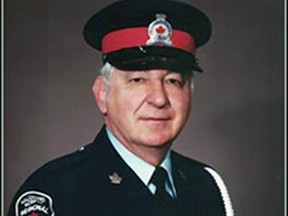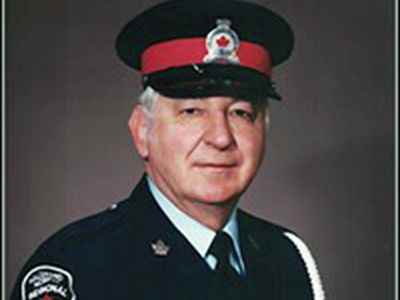Delhi law enforcement had hands full during harvest

Much has been said over the past two years about frontline workers who go that extra mile to keep the community safe and secure.
For men like Jack Foglton and his colleagues on the former Delhi Police Force, laying it on the line was a routine part of the job long before COVID-19, especially for the eight weeks of harvest each summer during the heyday of tobacco in the 1950s , 1960s and 1970s.
“He was a fine police officer and afraid of no man,” says Al Vandepoele, 84, of Delhi, who began his policing career in the late 1950s with the Delhi force. “There were hard times. There were a couple riots. It’s hard to describe how dangerous it was at times.”
John (Jack) Foglton died Jan. 20 in London. He was 88.
A native of Delhi, Foglton joined the town force in May, 1956. A career calling such as this was not for the faint of heart. While the tobacco belt was booming, Delhi was its epicenter and a magnet in eastern North America for every desperado with a strong back and an appetite for fast money.
Vandepoele – who retired from policing about 25 years ago as chief of the Haldimand-Norfolk Regional Police – said rowdyism and lawlessness were chronic problems in Delhi during harvest back in the day. It was routine to arrest more than 40 transients a weekend, he said, with “60 per cent” of all arrests involving individuals with criminal records.
Foglton was on the front line the two times Delhi Mayor Arn Sayeau stood on a firetruck and read the Riot Act to hundreds of angry transients gathered on the outskirts of town in “The Jungle” on Swimming Pool Road.
The Jungle was a transient labor camp where drifters would idle in the hope of catching on with a local tobacco crew.
They would start arriving in mid-July and – by mid-August – would know if the trip was worthwhile. Those still in the camp by then were left high and dry. Most had nothing except the clothes on their back and a gnawing hunger in their stomach. That’s when unrest became an issue.
Vandepoele said transients were steered to The Jungle because — otherwise — they would squat in Delhi’s parks and other open spaces downtown. When transients were in the mood to rip up the core, Vandepoele and the rest of the force were grateful to have Delhi firefighters by their side to hose down the mob.
“To say there were a few criminals around would be an understatement,” Vandepoele said. “During that six to eight weeks of harvest, there was bootlegging, prostitution, and lots of robberies. Those were days that will never be repeated.”
A beat cop like Foglton, Vandepoele said, earned about $350 a week in the 1960s. All officers were expected to report for duty seven days a week during harvest, he added, with no one drawing extra pay for overtime.
“We worked 12 to 16 hours a day,” Vandepoele said. “And I must say, we were happy in our work. There were no complaints. It was part of the job. It was rough but it was handled.”
Delhi County. Mike Columbus remembers Foglton as well suited to policing. Columbus said Foglton was a natural diplomat who had a calming effect on people.
“Jack was a highly respected member of law enforcement,” Columbus said. “Jack was one of the last police officers who could share stories of how hectic things were in Delhi at the time.”
A private family service has been held, with interment afterward in Delhi Cemetery. Once the COVID-19 pandemic passes, a celebration of life will be organized in Foglton’s memory.
